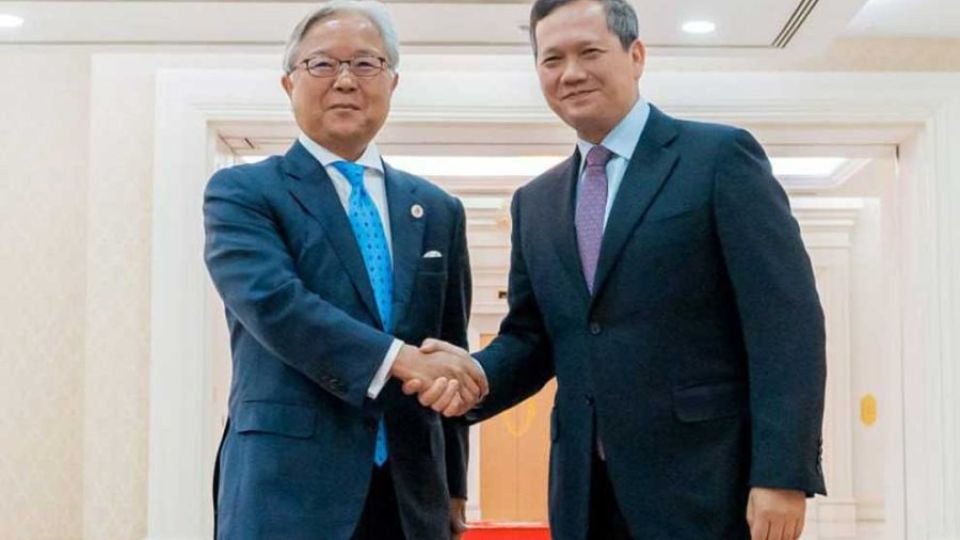March 26, 2024
PHNOM PENH – Following the upgrading of Cambodia-Japan bilateral relations to a “comprehensive strategic partnership” last year, a senior Japanese diplomat has underscored that although the two countries’ bilateral ties are currently sufficiently robust and positive, he urges that they be further strengthened.
The upgrade took place in 2023, as the two countries marked the 70th anniversary of the establishment of diplomatic relations.
“Through the ‘comprehensive strategic partnership’, we would like to further develop bilateral relations. They are currently strong, but under the new partnership, we would like to develop them further,” said Japanese ambassador to Cambodia Atsushi Ueno.
Ueno made the statement at a March 21 seminar, held in Phnom Penh to discuss ASEAN-Japan cooperation and the role of Japan-Cambodia relations.
Politics and diplomacy
In the field of politics and diplomacy, Ueno noted that high-level visits are developing smoothly. He explained that since the inauguration of the seventh-mandate government, Prime Minister Hun Manet has already met with Japanese Prime Minister Fumio Kishida twice, once in the Indonesian capital Jakarta last September, and once in Japan’s Tokyo in December.
“We have seen many high-level reciprocal visits,” he said.
Defence cooperation
Military cooperation is also progressing well, Ueno said. Coincidentally, Manet is a former commander of the Royal Cambodian Army, while the top officer of the Japan Self-Defence Forces (JSDF), General Yoshihide Yoshida, was formerly head of its ground self-defence forces.
“Both of them are former army chiefs, so they have excellent personal relations. Based on these kinds of personal ties, defence cooperation between the two nations is developing smoothly.
“Japanese ground service forces and the Royal Cambodian Army have formed a memorandum of cooperation for major dual training exercises,” he stated.
Ueno recalled that Japan Maritime Self-Defence Force (JMSDF) naval vessels visited Sihanoukville port twice last year and have already docked once this year.
People-to-people exchanges
Ueno described the Japan Alumni of Cambodia (JAC) organisation as core contributor to cooperation between the two countries, saying the embassy will further develop its cooperation with the JAC.
“Today’s event is one of our efforts to strengthen our relations with you. Not only through JAC, of course; the embassy would like to extend our communications with other Japan-related Cambodians as well.
“We would like to strengthen our efforts in the field of Japanese language training, cultural exchanges, and so on,” he said.
The economy
Regarding economic connections, Ueno explained that Manet is very eager to invite more investment from Japan, adding that during his leader’s meeting with Kishida last December, Manet proposed the establishment of a Cambodia-Japan Special Economic Zone (SEZ).
“I have been speaking with senior officials from the Council for the Development of Cambodia (CDC) and other relevant ministries and agencies about how to deal with Manet’s proposal.
“Frankly speaking, just establishing the SEZ will not guarantee investment from Japan. But I believe Cambodia has huge potential to attract more foreign direct investment, including from Japan. I’m talking with the CDC’s senior leadership and others about how we can increase investment from Japan,” he said.
During the seminar, government senior minister Sok Siphana recalled Manet’s visit to Thailand last month, where the prime minister discussed how to improve the complementary nature of the SEZs of both sides with his Thai counterpart Srettha Thavisin.
“I see here a lot of opportunities to attract not just new Japanese companies but businesses which are already established in Thailand,” he said, adding that this way, they can outsource some of the supply chains to the Cambodian side.
“I foresee that in the next four or five years, Cambodia will be benefiting quite a bit from this regional trend from the sub-region and from Japan. I would also like to see the Kingdom embrace the new trend of renewable energy,” explained Siphana.
Civil society
Regarding civil society, Ueno said Japan has been working closely with Cambodia on the path of democratic development, and will continue to support the democratic development of the Kingdom in various ways.
Wider development
The envoy explains that Japan will continue to provide official development assistance (ODA) to Cambodia in various fields, as well as the newer priority fields of digitalisation and enhanced connectivity.
“We are already providing support in areas like demining, water supply, environment and some priority areas designated in phase one of the Cambodian government’s Pentagonal Strategy, like human resources development and governance reform. We would like to provide cooperation in additional areas as well,” he said.
Speaking at the seminar, JAC member Sim Vireak expressed his belief that as Cambodia is aiming to become an upper-middle-income economy by 2030 and a high-income status by 2050, future discussions should focus on how the Kingdom and Japan can become a part of the solutions to each other’s problems.
“I don’t know, maybe in the future we might discuss how we could establish a Cambodia-Japan FTA [free trade agreement], or maybe we set up and facilitate free visas for both Cambodian and Japanese tourists, or perhaps we think about how we can promote Cambodia’s role within Japan’s production and supply chains in Southeast Asia?” he asked rhetorically.
“Perhaps Cambodia could become Japan’s logistics hub in the Mekong region? How can Cambodian businessmen buy Japanese technologies to drive innovation and the industrial base here in Cambodia? Maybe be need to work out how to develop more regional infrastructure to support the digital economy?” he mused.
Vireak added that Japan and Cambodia have a lot to share and discuss with each other, in order to benefit from the larger landscape of the Mekong basin, as well as ASEAN as a whole.


